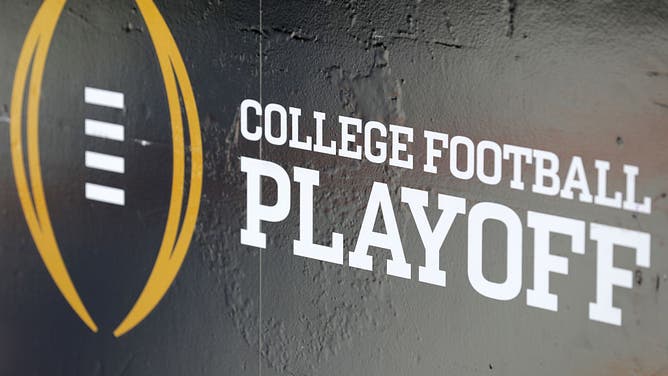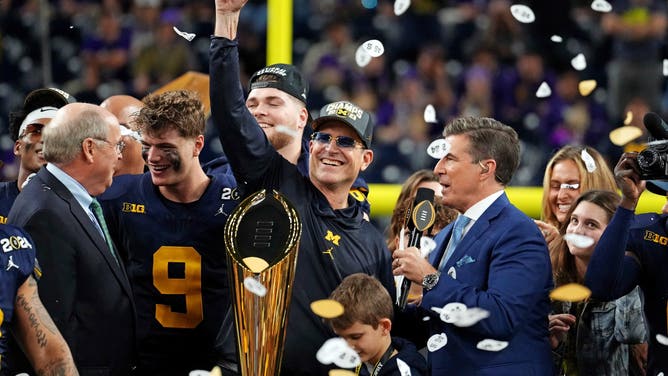College Football Playoff, ESPN Not There Yet? 'Pac-12' Trying To Hang On, While CFP Could Vote On New Format
An important College Football Playoff committee meeting will start on Tuesday in Dallas, which could affect the long term future of both scheduling formats and potential television rights with ESPN.
After a week off, the contingent will meet in Texas to discuss a path forward when it comes to what the playoff format will look like going forward. Certainly, how many teams get an automatic bid is an important factor in the discussions this week, but so are the parameters of a television contract that comes to an end in 2025.
According to a report from Ross Dellenger, the "agreed upon" television deal with ESPN that would see the network pay the CFP over $7 billion through 2031 has not been agreed to by any branch of the committee, with MAC commissioner Jon Steinbrecher letting other officials know through email that this was not the case.
"Several news outlets are reporting that a new six-year television deal has been concluded for the College Football Playoff," Yahoo reported that Steinbrecher wrote to officials last week. "Be advised, these reports are incorrect. Neither the management committee (commissioners) nor the Board of Managers (presidents) have reviewed a draft agreement now has any vote been taken."
One of the most interesting parts of this whole email is that Steinbrecher is calling the reports incorrect. The phrasing of this report could be outlined as "premature," not incorrect. It's obvious that some members of the committee are happy with what ESPN has brought to the table in-terms of broadcasting the college football playoffs over the next six years.

This type of language and details of a deal don't just appear out of thin air, but could be looked upon as a major negotiating tactic by ESPN. Sure, the playoff committee hasn't technically voted on the new deal, but that doesn't mean each member hasn't agreed upon the financial details in some type of straw poll.
We are in crunch time at the moment, with the playoff format changing to twelve teams this upcoming season, along with the current television deal coming to an end. But there are still hoops to jump through when it comes to setting up the future and making every conference happy, which will be hard to achieve.
Scheduling Formats, Revenue sharing And Future Bids
As we all witnessed a few weeks ago, the Big Ten and SEC have gone into business together, for the sake of college football. The last part was a little sarcastic, but both conferences feel as if they deserve a bigger piece of the pie when it comes to revenue. Expansion from both conferences this summer will have the SEC and Big Ten as college football juggernauts, and it's hard to argue the phrasing.
The ACC seems to be on some type of life-support that is hanging on to every single thing that Florida State does over the next year. Instead of headlines promoting the conference, we're headed for either a mediation or courtroom battle over the haunted ‘Grant Of Rights’ that the Seminoles are currently trying to break away from. If Florida State gets its way, the ACC could be scrambling in two years to prevent the dam from breaking and others joining the Seminoles.

So, while the ACC tries to hold onto its spot in college football, the group formerly known as the Pac-12 is looking to keep its spot at the adults table for a few more years. While it's just Oregon State and Washington State at the moment, the Pac-12 conference, even if only by name until the summer, still holds voting rights that is currently preventing a unanimous vote on playoff format changes.
Given that the new "Pac-2" is not going to be eligible for an automatic spot in the CFP, both teams are still trying to sway what remaining power they have. The problem is that a two-team conference will not be able to keep getting a large piece of the pie. Currently, both schools are receiving an annual $6 million payout for the next full year, but that runs out after the 2025 playoff deal. Then, they could be dropped to the lower-tier Group of Five payouts, which is $1 million per year.
There's not a new revenue plan sitting on the table, but we could see the remaining ‘Pac-12’ present one this week in Dallas. At the end of the day, this is a Hail Mary for both Washington State and Oregon State to continue receiving its voting power and revenue distribution, arguing that it's not their fault schools decided to leave.
The playoff format would switch to the "5+7" format, which would see the CFP have five automatic playoff berths from conference champions, but would then increase at-large bids from the current six, to seven.
No matter how each side wants to spin a potential television deal or work towards voting on a new playoff format, everybody will not come out satisfied. But as the college football world continues to change, so does the power structure within the College Football Playoff Board of Managers and Management Committee.
We are headed down a new path in the sport, and some member conferences are going to get bullied into a few distinct changes, but at least they'll still have a spot at the table. As the group meets in Texas over the next few days, expect to see a number of conferences try to cause a little bit of chaos, just to show they still have the voting power.
But at the end of the day, the SEC and Big Ten are sitting at the head of the table in terms of perceived power. Now we're about to find out just how much power Greg Sankey and Tony Petitti truly have.